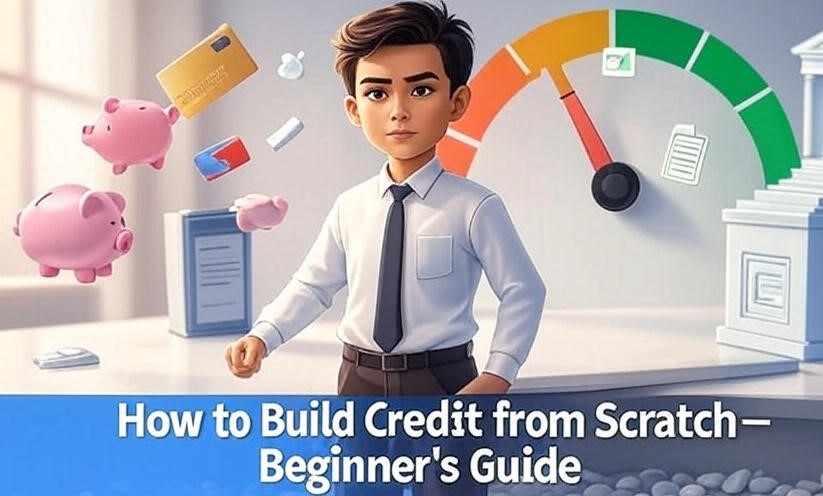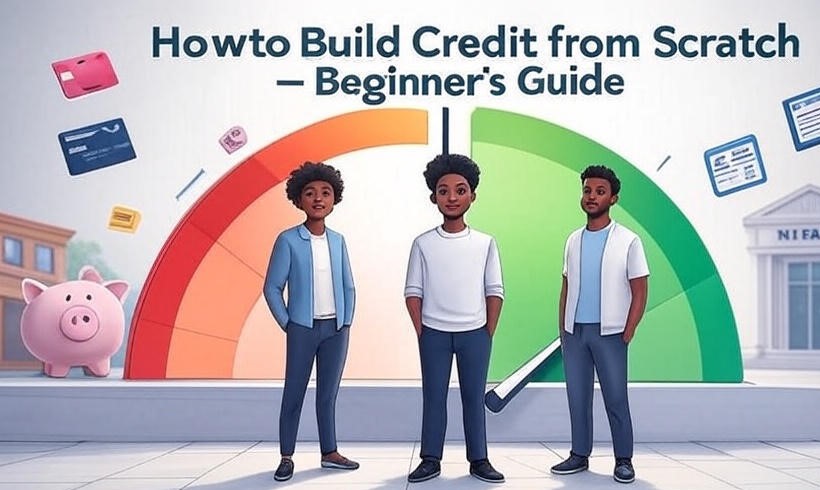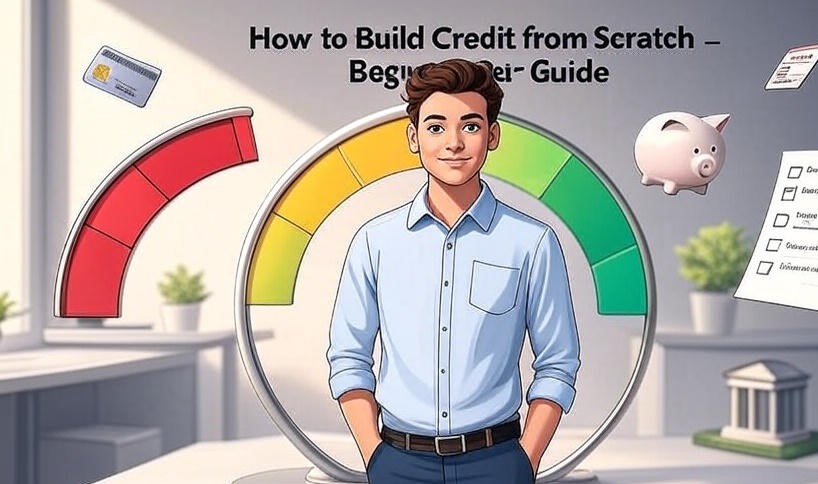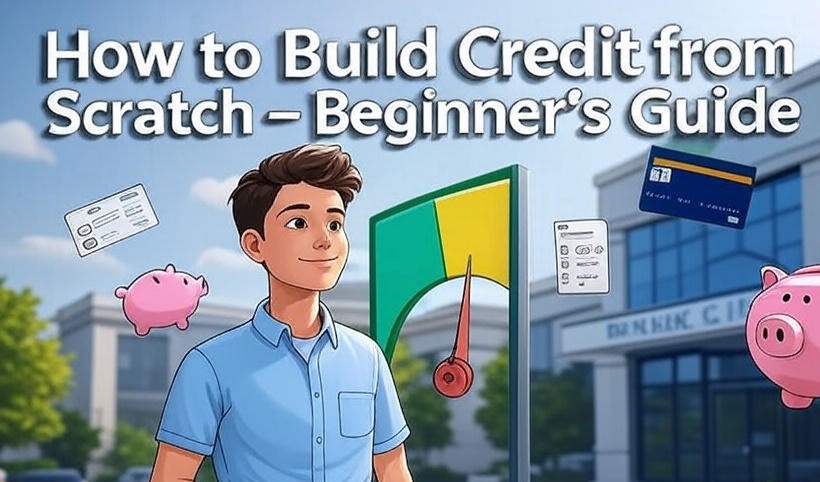Building credit from scratch can feel overwhelming, especially if you have never had a loan, a credit card, or even a bill in your name. Yet, establishing a solid credit history is one of the most important steps toward financial independence. A strong credit profile makes it easier to qualify for loans, rent an apartment, purchase a home, and even secure certain jobs.
This comprehensive guide will walk you through everything you need to know about building credit when you are starting from zero. Whether you are a young adult, new to the country, or simply someone who has never borrowed before, you will find clear, practical strategies here.
In this How to Build Credit from Scratch – Beginner’s Guide, we will cover credit basics, step-by-step strategies to start building, common mistakes to avoid, realistic timelines, and frequently asked questions. By the end, you will have a roadmap for creating a strong financial foundation.
Understanding Credit Basics
What Is Credit?
Credit is your financial reputation. It shows lenders how responsible you are with borrowed money. Your credit history is a record of your past borrowing and repayment activity, while your credit score is a numerical snapshot of that history. How to Build Credit from Scratch – Beginner’s Guide (2025).
Credit Score vs. Credit History
- Credit History: A detailed record of loans, credit cards, payments, and inquiries.
- Credit Score: A three-digit number (typically 300–850 in the U.S.) that reflects your creditworthiness.
Both are essential: your history is the story, while your score is the quick summary.
Why Good Credit Matters
Having good credit can:
- Secure lower interest rates on loans.
- Improve your chances of getting approved for credit cards or mortgages.
- Help with renting housing or signing up for utilities.
- Even influence job opportunities, since some employers review credit reports.
Without credit, you may face higher costs, security deposits, or outright denials. For instance, a landlord may require a larger deposit if you lack credit history, and some utility companies may require upfront payments.
How Credit Scores Are Calculated
Most scoring models, such as FICO and VantageScore, use similar factors:
- Payment History (35%): Paying on time is the most important factor.
- Credit Utilization (30%): How much credit you use compared to your limit.
- Length of Credit History (15%): Older accounts help your score.
- Types of Credit (10%): A mix of credit cards, loans, and other accounts.
- New Credit Inquiries (10%): Too many applications in a short time can hurt your score.
Knowing these components helps you make better choices when building credit from scratch. For example, even if you only have one credit card, keeping the balance low and paying on time can contribute significantly to your score.
Step-by-Step Roadmap to Build Credit from Scratch
Step 1: Open Your First Credit Account
If you have no credit, start with:
- Secured Credit Cards: Requires a cash deposit as collateral. Perfect for beginners who want to build history safely.
- Student Credit Cards: Designed for young adults with limited history and often come with lower credit limits.
- Retail Store Cards: Easier approval but often higher interest, so use cautiously.
The key is choosing an option that reports to all three major credit bureaus: Equifax, Experian, and TransUnion.
Step 2: Become an Authorized User
Ask a trusted family member or friend with good credit to add you to their account. Their positive payment history can benefit your report. Ensure the issuer reports authorized user activity, otherwise it will not affect your credit.
Step 3: Report Rent and Utilities
Some services allow you to add rental payments, phone bills, or utilities to your credit file. This gives lenders a record of responsible payments, even without traditional credit. For people who have been paying rent for years, this can be an easy way to establish history quickly.
Step 4: Apply for a Credit-Builder Loan
Credit unions and online lenders often offer these loans. The borrowed money is held in a savings account until you finish making payments, at which point you receive the funds. This helps you build payment history safely and demonstrates responsibility.
Step 5: Practice Responsible Credit Use
- Always pay bills on time.
- Keep balances below 30% of your credit limit (ideally under 10%).
- Avoid cash advances or unnecessary debt.
Step 6: Monitor Your Credit Progress
Use free credit report tools to check your score. Federal law allows you one free report annually from each bureau via AnnualCreditReport.com. Monitoring helps you spot errors or fraud early and ensures your positive actions are reflected correctly.
Step 7: Avoid Common Pitfalls
- Too Many Applications: Each hard inquiry can lower your score.
- Closing Old Accounts: This shortens your credit history.
- Carrying High Balances: Leads to high utilization, lowering your score.
Building credit is about steady, responsible behavior—not quick tricks. Patience and consistency matter more than anything else.
How Long Does It Take to Build Credit?
Typically, it takes three to six months of responsible activity for your first credit score to appear. Building strong credit may take years, but patience pays off. Remember:
- On-time payments build trust quickly.
- Negative marks, like missed payments, can take years to recover from.
- Diversifying accounts (adding a loan later, for instance) helps in the long run.
Common Myths About Building Credit
Myth 1: You Must Carry a Balance
False. Paying off your card in full each month helps your score and saves money. Interest charges only cost you more.
Myth 2: Checking Your Score Hurts Credit
False. Personal checks are “soft” inquiries and have no impact. Only hard checks from lenders can affect your score.
Myth 3: You Can’t Build Credit Without Debt
False. Tools like credit-builder loans or secured cards are designed for safe, low-risk credit history building without major debt.
Myth 4: Closing a Card Improves Your Score
False. Closing accounts often shortens your history and reduces available credit, raising utilization.
Real-Life Example: Starting from Zero
Consider Sarah, a 22-year-old graduate with no credit history. She started with a secured credit card, using it only for groceries and paying the balance in full each month. At the same time, she became an authorized user on her mother’s card. Within six months, Sarah had a credit score in the mid-600s, enough to qualify for a student-friendly rewards card. Over time, her careful habits helped her score rise above 750. How to Build Credit from Scratch – Beginner’s Guide (2025)
Now consider David, a 30-year-old who moved to the U.S. without any local credit history. He began with a credit-builder loan at a local credit union while also signing up for a service that reported his rent. Within a year, David had a strong enough credit profile to qualify for an auto loan at a fair interest rate.
These examples show that no matter your background, disciplined habits and the right tools can set you up for success.
Extended FAQs on Building Credit
Q1: How soon can I get a credit score after opening my first account?
Usually within three to six months, depending on activity.
Q2: Should I get multiple credit cards at once?
No. Start with one, build history, then consider diversifying after six to twelve months.
Q3: Can rent payments really improve credit?
Yes, but they need to be reported through services like Experian Boost or rental-reporting companies.
Q4: Do student loans count toward credit history?
Yes, as long as they are reported and payments are made on time.
Q5: What is the best first credit card for beginners?
Secured cards and student cards are most suitable. Choose one that reports to all three credit bureaus.
Q6: Can I build credit without a credit card?
Yes. Credit-builder loans, rent reporting, and installment loans can all help.
Q7: What happens if I miss a payment?
A late payment can stay on your report for up to seven years and significantly hurt your score, especially if your history is short.
Q8: Is there a minimum income required to get a credit card?
Yes, issuers usually require proof of income, but secured cards often have more flexible requirements.
Q9: Will applying for a credit card hurt my score?
A single hard inquiry may lower your score by a few points temporarily, but responsible use outweighs this impact.
Q10: How long before I can qualify for a mortgage?
Many lenders prefer at least two years of history, though you may qualify earlier with a strong score and stable income.
Advanced Tips for Strengthening Credit Faster
- Automate Payments: Set up auto-pay to avoid missing due dates.
- Use Credit for Essentials Only: Buy what you can already afford and pay off quickly.
- Increase Credit Limits Carefully: As your history improves, request higher limits to lower utilization.
- Keep Old Accounts Open: The longer your accounts remain active, the better for your history.
- Diversify with Time: Once comfortable, consider an installment loan or second card.
Conclusion
Building credit from scratch may seem intimidating, but with the right approach, it is entirely achievable. Start small, be consistent, and focus on healthy habits like on-time payments and low balances. Avoid common mistakes, and monitor your progress regularly. Over time, your positive habits will compound, leading to excellent credit and financial opportunities.
This How to Build Credit from Scratch – Beginner’s Guide provides a step-by-step roadmap to help you establish a strong financial foundation. Remember, good credit takes time, but each responsible action today sets you up for better opportunities tomorrow. Whether you are fresh out of school, newly arrived in a country, or simply starting late, the principles remain the same: patience, consistency, and responsibility are the keys to lasting financial success.












